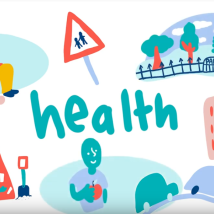June Food Thinkers Webinar: 'Considering the relationship between food, precarity and poverty in public health' - 16th June 2020
Dr Claire Thompson (University of Hertfordshire)
Prioritising Prevention Webinar - 24th November 2020
The COVID-19 pandemic and resulting global health challenges have starkly demonstrated the weaknesses and fragility of our current health systems. People with pre-existing non-communicable diseases, often modifiable through concerted prevention, are more likely to suffer adverse outcomes and increased mortality.
The NIHR Applied Research Collaboration East of England (ARC EoE) together with the Centre for Science and Policy (CSaP) and the Population Health Research Hub East of England (PHResH EoE) hosted a successful webinar on this theme of prioritising prevention on the 24th of November 2020. Participants heard from expert guest speakers and took part in discussions, providing insights on how we can harness the potential of our existing infrastructures to build a bold vision for prevention and influence regional practice and research.
The webinar was the first in a series which viewed this challenge from a diverse range of perspectives to address questions including:
- What does the future of prevention look like?
- What influence has the COVID-19 pandemic had on the current and future prevention agenda?
- How can we make the case for investing in and advocating for prevention now?
The seminar informed a second seminar and workshop early in March2021, where what the ‘prevention’ agenda means was further considered.
You can download a copy of the webinar slides here and Jim McManus' slides here.
Access all the videos here
The full report can be accessed here
ARC-CSaP-PHResH Prevention Webinar: Strengthening Communities and Society for Collective Action - 10th March 2021
This webinar was the second in a series on prevention (see details of the first above), where we gained insights into the broad factors influencing the health of communities, new measures of evaluating population health, and ideas for behavioural interventions to improve health.
This challenge was viewed from a diverse range of perspectives to address questions including:
- How is poverty and precarity experienced and in what ways does this influence the ability to have a good quality of life?
- How should we engage and empower communities in prevention efforts?
- How do we consider more holistic approaches to measuring success in prevention and wellbeing? What does success look like?
- What assets as well as barriers exist within communities and how can behavioural interventions work with these to prevent poor health?
